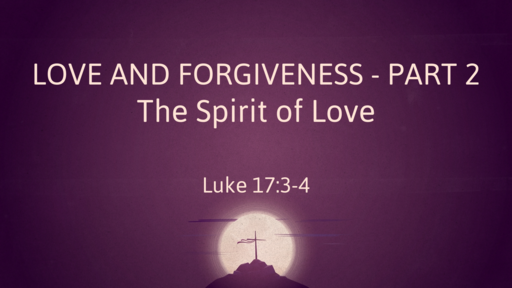Love and Forgiveness - Part 2

Sermon • Submitted • Presented • 39:52
0 ratings
· 26 viewsFiles
Notes
Transcript
INTRODUCTION
Pay attention to yourselves! If your brother sins, rebuke him, and if he repents, forgive him, and if he sins against you seven times in the day, and turns to you seven times, saying, ‘I repent,’ you must forgive him.”
Forgiveness is very important in the Bible
For if you forgive others their trespasses, your heavenly Father will also forgive you, but if you do not forgive others their trespasses, neither will your Father forgive your trespasses.
FORGIVENESS IS NOT OPTIONAL
Three Areas We Will Cover
What Forgiveness Is
What Forgiveness is Not
Difference Between Forgiveness and Reconciliation
What Is Forgiveness
What Is Forgiveness
Owe no one anything, except to love each other, for the one who loves another has fulfilled the law.
Forgiveness means dismissing a debt
Forgiveness means dismissing a debt
When you receive forgiveness, your debt is dismissed.
You are released from any requirement for repayment.
“But I say to you who hear, Love your enemies, do good to those who hate you,
Forgiveness is dismissing your demand that others owe you something
Forgiveness is dismissing your demand that others owe you something
Especially when:
— They fail to meet your expectations.
— They fail to keep a promise.
— They fail to treat you justly.
You release your right to hear “I’m sorry”
You release your right to be bitter
You release your right to get even
You release your right to dwell on the offense
You release your right to hold on to the offense
You release your right to keep bringing up the offense
But I say to you, Do not resist the one who is evil. But if anyone slaps you on the right cheek, turn to him the other also.
And Jesus said, “Father, forgive them, for they know not what they do.” And they cast lots to divide his garments.
Question: Is it possible to sin beyond God’s ability to forgive?
Question: Is it possible to sin beyond God’s ability to forgive?
I acknowledged my sin to you, and I did not cover my iniquity; I said, “I will confess my transgressions to the Lord,” and you forgave the iniquity of my sin. Selah
Have mercy on me, O God, according to your steadfast love; according to your abundant mercy blot out my transgressions. Wash me thoroughly from my iniquity, and cleanse me from my sin! For I know my transgressions, and my sin is ever before me. Against you, you only, have I sinned and done what is evil in your sight, so that you may be justified in your words and blameless in your judgment.
What Forgiveness is Not
What Forgiveness is Not
Forgiveness is not circumventing God’s justice.
— It is allowing God to execute His justice in His time and in His way.
Forgiveness is not waiting for “time to heal all wounds.”
— It is clear that time doesn’t always heal wounds; some people will not allow healing.
Forgiveness is not letting the guilty “off the hook.”
— It is moving the guilty from your hook to God’s hook.
Forgiveness is not excusing wrong behavior.
— It is acknowledging that wrong behavior is without excuse, while still forgiving.
Forgiveness is not explaining away the hurt.
— It is working through the hurt.
Forgiveness is not based on what is fair.
— It was not “fair” for Jesus to hang on the cross—but He did so that we could be forgiven.
Forgiveness is not being weak.
— It is being strong enough to be Christlike.
Forgiveness is not stuffing your anger.
— It is resolving your anger by releasing the offense to God.
Forgiveness is not a natural response.
— It is a supernatural response, empowered by God.
Forgiveness is not denying the hurt.
— It is feeling the hurt and releasing it to God.
Forgiveness is not being a doormat.
— It is seeing that, if this were so, Jesus would have been the greatest “doormat” of all!
Forgiveness is not conditional.
— It is unconditional, a mandate from God to everyone.
Forgiveness is not forgetting.
— It is necessary to remember before you can forgive.
Forgiveness is not a feeling.
— It is a choice—an act of the will.
Forgiveness is not the same as reconciliation.
— It takes two to reconcile, but it takes only one to forgive.
Difference Between Forgiveness and Reconciliation
Difference Between Forgiveness and Reconciliation
Forgiveness focuses on the offense; reconciliation focuses on the relationship.
Forgiveness requires no relationship. However, reconciliation requires a relationship in which two people, in agreement, are walking together toward the same goal.
“Do two walk together, unless they have agreed to meet?
Forgiveness can take place with only one person.
— Reconciliation requires at least two people.
Forgiveness is directed one-way.
— Reconciliation is reciprocal, occurring two ways.
Forgiveness is a decision to release the offender.
— Reconciliation is the effort to rejoin the offender.
Forgiveness involves a change in thinking about the offender.
— Reconciliation involves a change in behavior by the offender.
Forgiveness is a free gift to the one who has broken trust.
— Reconciliation is a restored relationship based on restored trust.
Forgiveness is extended even if it is never, ever earned.
— Reconciliation is offered to the offender because it has been earned.
Forgiveness is unconditional, regardless of a lack of repentance.
— Reconciliation is conditional, based on repentance.
Conclusion
Question: “What can I do when I don’t feel like forgiving?”
Question: “What can I do when I don’t feel like forgiving?”
Examine your thoughts
Know that you cannot control what your offenders do, but you can control what you think about the offenders.
Finally, brothers, whatever is true, whatever is honorable, whatever is just, whatever is pure, whatever is lovely, whatever is commendable, if there is any excellence, if there is anything worthy of praise, think about these things.